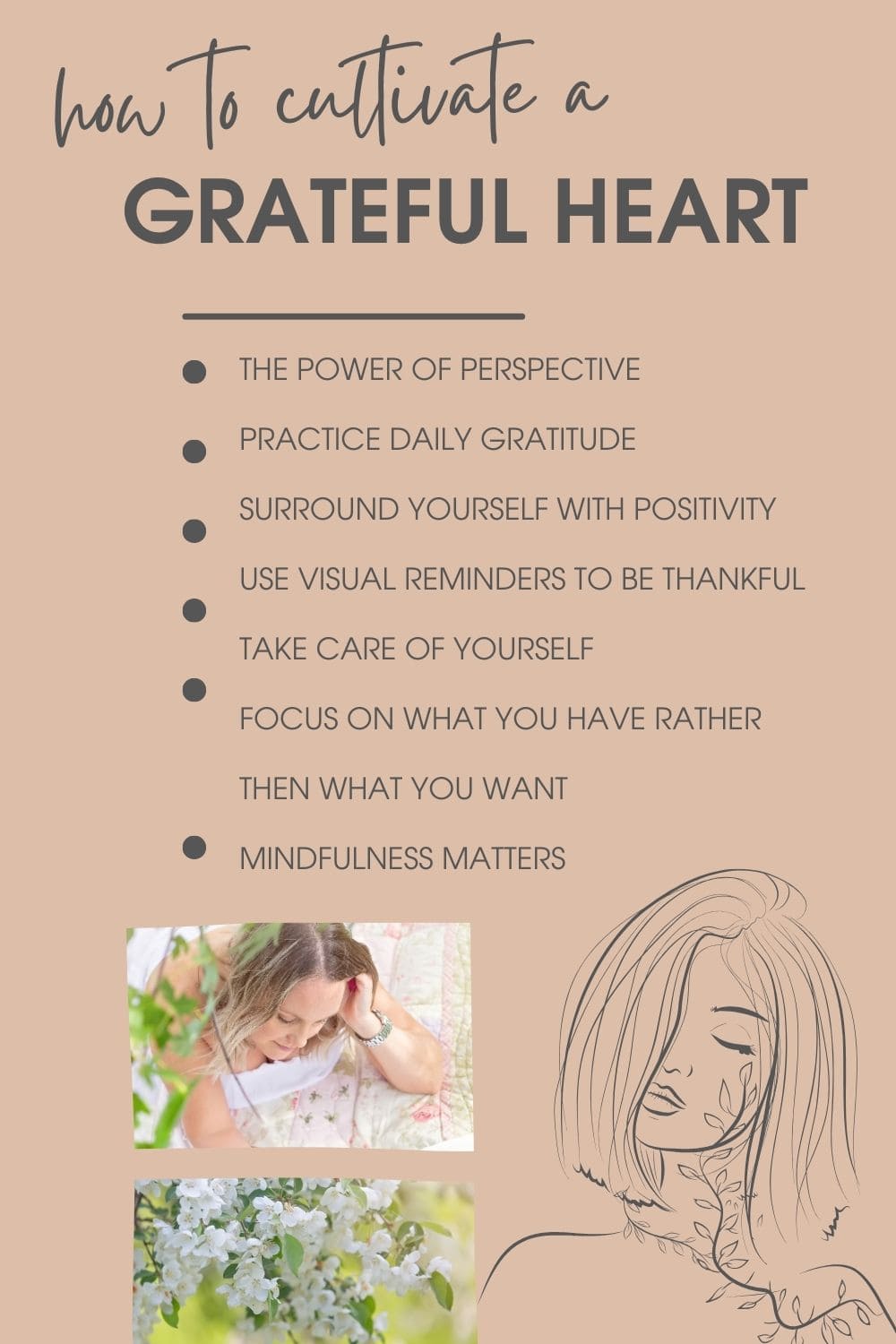How to Cultivate a Grateful Heart: Tips for a More Joyful Life
If you’re looking to live a happier, more fulfilling life, cultivating a grateful heart is an essential step. Having a grateful heart means feeling thankful for the good things in your life, even when things aren’t going exactly as planned. This simple guide will teach you how to have a grateful heart in 7 simple steps, so you can cultivate joy and gratitude in your own life.
How To Have A Grateful Heart
Having a grateful heart is a wonderful trait that can bring positivity and joy to your life. It allows you to appreciate the blessings in your life and focus on the good things, even when faced with difficult circumstances.
Having a grateful heart means being able to find joy and appreciation in the small things, as well as the big things.
But what does it mean to have a grateful heart?
What Does It Mean To Have A Grateful Heart?
Having a grateful heart means having an attitude of gratitude towards life. It is about appreciating the good things in your life, both big and small.
Gratefulness is not just a feeling, it is also a mindset that you can cultivate.
When you have a grateful heart, you tend to focus on the positive aspects of your life and become less preoccupied with negativity.
You’re able to find happiness and contentment in the present moment, rather than constantly chasing after something more.
Grateful people are generally happier and more content with their lives. They are also more resilient in the face of adversity.
When you have a grateful heart, you are better able to cope with difficult situations because you are able to find comfort in the good things that you have.
Having a grateful heart also means being generous and comforting towards others. When you are grateful, you are more likely to be kind and compassionate towards others. You are also more likely to be generous with your time, resources, and energy.
Overall, having a grateful heart is about cultivating a positive mindset that allows you to appreciate the good things in your life, find comfort in difficult times, and be generous and kind towards others.

Why Is Practicing Gratitude Important?
Practising gratitude is an essential habit that can have a significant impact on your overall well-being.
A gratitude practice involves focusing on the things in your life that you are grateful for, such as the people, experiences, and possessions that bring you joy and happiness.
One of the most significant benefits of gratitude practice is that it can help you develop a more positive outlook on life. When you focus on the things that you are grateful for, it becomes easier to see the good in every situation. This positive perspective can help you feel happier and more content with your life.
A gratitude practice can also help you build stronger relationships with others. When you express gratitude towards the people in your life, it can help them feel appreciated and valued. This, in turn, can strengthen your bond with them and lead to more positive interactions.
In addition to these emotional benefits, having a gratitude practice has been shown to have physical benefits as well. Studies have found that practising gratitude can lead to improved sleep, reduced stress levels, and lower rates of depression and anxiety.
7 Steps To Cultivate A Grateful Heart
Gratitude is a powerful emotion that can help you lead a happier life. It can help you appreciate the good things in your life, even when things are tough. Here are seven steps you can take to cultivate a grateful heart:
1. The Power Of Perspective
Having a grateful heart starts with the power of perspective. It’s about shifting your focus from what you don’t have to what you do have. It’s about recognising the good in your life, even when faced with challenges.
When you take a step back and look at the big picture, you’ll realise that there’s so much to be grateful for. You have a roof over your head, food on the table, and people who love you. These are all things that we often take for granted, but they are blessings that we should be thankful for.
Even when faced with illness or challenges, having a grateful heart can help you find peace and comfort. You can be grateful for the doctors and nurses who are working tirelessly to help you heal. You can be grateful for the support of your loved ones who are there for you during tough times.
Sometimes we need to pivot our perspective to find our path again. And that path may not be easy or expected, but it can lead to some magic at the other end.
2. Practice Daily Gratitude
One of the most effective ways to cultivate a grateful heart is to practice daily gratitude. This involves intentionally focusing on the good things in your life and expressing gratitude for them regularly.
One simple way to start a gratitude practice is to keep a gratitude journal.
Each day, write down three things that you are grateful for. Or even just a single thing if that feels more achievable.
They can be big or small, and they don’t have to be related to any specific event or occasion. It could be something as simple as enjoying a cup of coffee in the morning or having a supportive friend or family member.
Or if you find yourself struggling to maintain a daily journal habit, try other methods that work for you. Create a habit of focusing on the things you were grateful for that day as you brush your teeth or do your evening skincare regime.
Create a gratitude list of things that you are grateful for that you can look at every time you need a reminder.
Another option is to have a daily reminder, such as a phone reminder set to a certain time that asks you what you are grateful for today. Mine pops up at 9am each day and asks ‘What are you excited about today?” encouraging me to dig deeper some days than others to find that spark of joy but always starting my day with this focus.
Finally, consider incorporating gratitude into your holiday celebrations. Thanksgiving, for example, is a great opportunity to reflect on the things you are grateful for and express gratitude to the people in your life.
But don’t limit your gratitude practice to just one day a year – make it a regular part of your life and watch as it transforms your attitude and outlook.
3. Surround Yourself With Positivity
One of the best ways to cultivate a grateful heart is by surrounding yourself with positivity. When you surround yourself with positivity, you create an environment that is conducive to feeling grateful and optimistic.
Do this by choosing to spend most of your time with people who fill your cup and lift you up rather than those toxic people that suck away your energy.
The people we are surrounded by have a big impact on how we feel and the habits were adopt.
Envy is the enemy of gratitude.
When you are envious of others, you tend to focus on what you don’t have instead of what you do have. This can make it difficult to feel grateful for the blessings in your life.
To avoid envy, try to focus on your own accomplishments and blessings. Remember that everyone’s journey is different, and there is no need to compare yourself to others.
4. Use Visual Reminders To Be Thankful
One great way to cultivate a grateful heart is to use visual reminders to help you remember to be thankful. You can use anything that works for you, such as post-it notes with positive affirmations, inspiring pictures, or even objects that have special meaning to you.
For example, you could place a beautiful vase of flowers on your desk or nightstand to remind you to appreciate the beauty around you.
Or, you could create a gratitude jar where you write down things you are thankful for and place them inside. Then, when you’re feeling down, you can pull out a note and be reminded of all the good things in your life.
Another idea is to create a gratitude board or collage. You can use a bulletin board or a large piece of poster board and fill it with pictures, quotes, and other items that represent things you are grateful for.
This can be a fun and creative way to visually remind yourself of all the blessings in your life.
Lastly, you can use affirmations to help shift your mindset towards gratitude. Affirmations are positive statements that you can repeat to yourself to help reframe your thoughts, such as these new year affirmations or these body positive affirmations.
For example, you could say “I am grateful for all the love and support in my life” or “I am thankful for the opportunities that come my way”.
By using visual reminders and affirmations, you can train your brain to focus on the positive things in your life and cultivate a grateful heart.
Related Reading: 50 Self-Care Affirmations To Remind You To Take Care Of You
5. Take Care Of Yourself
Taking care of yourself is essential to having a grateful heart.
When you feel good physically, psychologically, and emotionally, it’s easier to appreciate the good things in life. Here are some ways to take care of yourself:
- Physical Health – Regular exercise can help you feel better physically and mentally. Eating a balanced diet can give you the nutrients you need to feel your best. Getting enough sleep can help you wake up feeling refreshed and ready to tackle the day.
- Practice Self-Love – Nurture yourself and focus on the positives rather than the negatives. Practising self-love does not come naturally to many of us but these self-love tips will help you prioritise yourself.
- Psychological Health – To improve your mental health, practice mindfulness, and gratitude. Mindfulness can help you be present in the moment and appreciate the little things in life.
- Self-Care – Self-care is taking care of yourself in a way that makes you feel good. It can be anything from taking a bubble bath to reading a book. The key is to do something that makes you feel relaxed and happy and self-care does not need to take a lot of time.
Related Reading – 80 Quick 5-Minute Self-Care Ideas For When You’re Short On Time
6. Focus On What You Have Rather Than What You Want
One of the most effective ways to cultivate a grateful heart is to focus on what you have rather than what you want.
When you focus on what you want, you tend to feel envy and frustration, which can lead to negative emotions and dissatisfaction with your life.
On the other hand, when you focus on what you have, you tend to feel grateful and content, which can lead to positive emotions and satisfaction with your life.
It’s natural to have regrets about things you didn’t do or missed opportunities, but it’s important not to dwell on them.
Instead, focus on what you have achieved and the positive experiences you have had. This can help you appreciate the good things in your life and feel grateful for them.
7. Mindfulness Matters
One of the most important aspects of having a grateful heart is mindfulness.
Mindfulness is the practice of being present in the moment, aware of your thoughts and feelings without judgment. It allows you to focus on the present rather than dwelling on the past or worrying about the future.
By practicing mindfulness, you can gain wisdom and understanding about yourself and the world around you. You can develop a big picture perspective that allows you to see beyond your own immediate concerns and appreciate the beauty and goodness in your life.
To practice mindfulness, set aside time each day to focus on your breath and your body. You can do this by sitting quietly and paying attention to your breath as it moves in and out of your body. If your mind wanders, simply bring your attention back to your breath.
Another way to practice mindfulness is to pay attention to your senses. Notice the sights, sounds, smells, tastes, and sensations around you. Be fully present in the moment and appreciate the richness of your experience.
In addition to formal mindfulness practices, you can also practice mindfulness throughout your day. For example, when you are eating, take the time to savor each bite and appreciate the flavors and textures of your food. When you are walking, pay attention to your surroundings and the sensations in your body.
Conclusion: Cultivating Gratitude
Cultivating a grateful heart means feeling thankful for the good things in your life, even when things aren’t going exactly as planned and being able to find joy and appreciation in the small things, as well as the big things. By practising daily gratitude and surrounding yourself with positivity, you can increase your feelings of gratitude and experience the many benefits of having a grateful heart.









